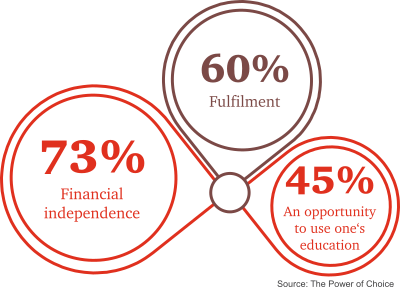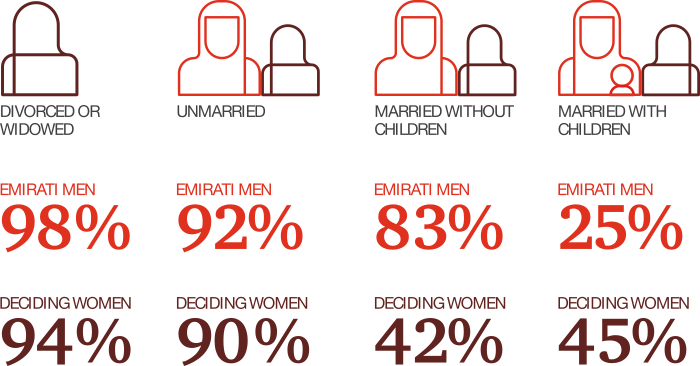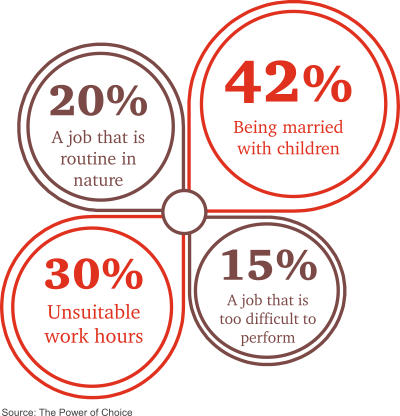Getting Emirati Women Into Work – Why Our Study Surprised Me…

Our team undertook the privileged task of working alongside the government body, Dubai Women Establishment (DWE), to explore opportunities to expand female Emirati participation in the local workforce.
The recently published landmark study, the first of its kind, now serves as a reference point for policy makers to better understand the aspirations of non-working Emirati women and pave the way for new initiatives that benefit the country’s progress.
The UAE is a progressive country from a labour market perspective, Emirati women are very well educated and the government supports the advancement of women in all sectors. In theory therefore, Emirati women have a wide array of working options.
Yet today, women make up only 28% of the total Emirati workforce, and participation levels are well below countries with a comparably favourable labour market context.
So what is behind this low participation rate? Is it even a problem? Is there an opportunity for the UAE to take a global lead in developing a better female or family friendly working environment for the future?
The ‘Power of Choice’ report, published this month, has allowed us to gain a better understanding of the reasons behind Emirati women’s decisions to not enter the workforce.
When we first took on the task of trying to understand the low rates of workforce participation, our approach was influenced by existing research that pointed to deep cultural and societal barriers. I was particularly delighted when our study led us to understand that these were truly out-of-date opinions.
We learned that education is one of the most important factors linked to job participation levels, and that having a role model in the family is essential.
We also learned that Emirati women will prioritise their role as a wife and a mother during the family formation years, when their kids are still very young, more so than women from other cultures.
Today, women make up only 28% of the total Emirati workforce.
Emirati women, for the most part, are open to working provided certain conditions are met. However, in the UAE, more so than in comparable countries, there is still work to be done to provide more options on flexible working hours and on-site child care.
In the absence of favourable working conditions, Emirati women are quite entrepreneurial and lean towards running their own businesses.
Above all, we found that Emirati women feel empowered to choose: they are choosing themselves when they want to work and in which sectors.
In fact, it seems to me that there is little difference between their preferences and those of many women seeking to balance family and work all over the world.
This is an encouraging report from both a social and economic standpoint. It makes me optimistic about the continued growth and prosperity of the UAE, an amazing country I have called home for the past ten years.
My PwC team and I are very proud to have been associated with the study and look forward to seeing its findings put into action supporting initiatives that continue to empower and inspire the women of the UAE.
Who are the deciding women?
The Transtheoretical Model and percentage of Deciding Women respondents in each stage
Deciding Women are Emirati women who have either never worked or have worked in the past but not actively looked for work or held a job for a minimum of four months prior to this study. The Deciding Women in this report fall into the first three TTM stages, based on how they described themselves at the beginning of the study.
Here are some highlights of the study, which surveyed 1,550 local women and 393 local men residing in the UAE:
Changing attitudes
As the next generation of Emiratis grows and evolves, so too does the thinking about what roles a woman can and should take on to contribute more widely to society.
Women in leadership roles are valued by both men and women throughout the nation, and these roles can take many forms including volunteering in the community and participating in the labour force. Working outside of the home is becoming the norm for women throughout the UAE. We have seen many inspiring women in leadership roles in the UAE, including H.E Hessa Bint Essa Buhumaid, Cabinet Member and Minister of Community Development, and H.E Mona Ghanem Al Marrie, Vice President of the UAE Gender Balance Council, both of which joined the panel for the launch of the "Power of Choice" report and continue to set a great example for women in the UAE and the region as a whole.
Once in the workforce, Deciding Women desire support for skills training (83%), starting a business (82%), and career guidance (81%).
In particular, younger women, who may have grown up with working mothers or other female working role models, are increasingly seeing work outside of the home as a desirable choice, given the right conditions.
The most frequently cited factors for entering into work

Multiple ambitions
Emirati women feel empowered to make their own life choices. They have increasing aspirations for success in many roles: as wives and mothers, as career women, and as contributors to their community and country.
They value national and community service and want to leverage their education and entrepreneurial spirit for self-fulfillment. These roles may differ at different life stages – for example, women tend to prioritise family when their children are young.
Family matters
Family remains at the core of an Emirati woman’s life and identity, and her family plays a prominent role in her decisions. Those who are wives and mothers consider their life choices primarily in light of fulfilling their important family roles.
If they are influenced by anyone, unmarried women’s choices are most often shaped by their parents, while married women are most influenced by their husbands. A woman’s openness to working outside of the home is directly related to her role models while she was growing up.
Acceptance levels among Emirati men and Deciding Women for women working at various life stages:

Source: The Power of Choice
Deciding women most frequently cited reasons for leaving the workforce as being:

Flexible working and entrepreneurship
Over 80 per cent of our study’s respondents have children. While being a wife and mother remains a priority, many women desire a successful career as well.
Flexible working options, including part-time work, shorter work hours, and small business opportunities, are a necessity for these women to appropriately balance their work and family life. There is a sectoral preference for education and healthcare.
Working in the private sector is viewed as an interesting option for many women, as it provides them with the opportunity to expand their horizons and exposes them to new skills, people, and working environments.
Great strides forward
The ‘Power of Choice’ report has shown that remarkable strides have been made in establishing a society where highly educated, confident, and pioneering women work side-by-side with men to support the UAE’s ongoing growth and prosperity.
As part of UAE’s vision 2021 to become one of the world’s top nations for gender equality, we are proud to support the nation in promoting gender balance and the status of Emirati women.
Whilst the findings suggest an overall willingness of Deciding Women to enter and remain in the workforce, a lack of awareness about the options and many practical factors impact their decision to do so.
Contact us

Sally Jeffery
Global Education and Skills Leader Partner, PwC Middle East
Tel: +971 (0)56 6820539







